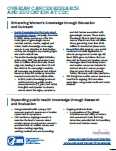What CDC Is Doing About Gynecologic Cancers
ABHACUS
CDC’s Division of Cancer Prevention and Control led an effort to produce a journal supplement entitled “Assessing the Burden of Human Papillomavirus (HPV)-Associated Cancers (ABHACUS).” This supplement uses cancer registry data to estimate how many HPV-associated cancers occurred in the United States before the release of the HPV vaccine, and to examine current patterns in the distribution of these cancers. Six articles in the supplement focus on cancer sites known to be associated with HPV, including the cervix, vulva, vagina, penis, anus, and oropharynx (back of the throat, including the base of the tongue and tonsils).
National Gynecologic Cancer Awareness Campaign
CDC developed the national gynecologic cancer awareness campaign, Inside Knowledge: Get the Facts About Gynecologic Cancer, to raise awareness of gynecologic cancers, including cervical cancer.
Continuing Education (CE)
Formative research for the Inside Knowledge campaign identified knowledge gaps among health care providers related to gynecologic cancers, indicating a need for additional education in this area. The Gynecologic Cancer Curriculum was developed to provide information and recommendations for symptom identification, screening and referral practices, and related care.
National Breast and Cervical Cancer Early Detection Program
The National Breast and Cervical Cancer Early Detection Program (NBCCEDP) supports activities that include screening, follow-up, case management, partnership development, professional development, and public education and outreach. Find out if you qualify for screening through the NBCCEDP.
National Program of Cancer Registries
Established in 1994, CDC’s National Program of Cancer Registries (NPCR) supports and promotes the collection and use of registry data in 45 states, the District of Columbia, Puerto Rico, the Republic of Palau, and the Virgin Islands. The NPCR collects surveillance data for all cancers, including cervical and other gynecologic cancers. Data collected are used by states to guide program planning, outreach, and education efforts.
Pre-Teen Vaccine Campaign
CDC’s Pre-Teen Vaccine campaign informs parents, caregivers, family physicians, and pediatricians about CDC’s vaccination recommendations, including the HPV vaccine for 11- and 12-year-old boys and girls.
Vaccines for Children Program
The Vaccines for Children Program is a federally funded program that provides vaccines at no cost to eligible children who might not otherwise be vaccinated because of inability to pay. The HPV vaccine is offered under this program to eligible females 9–18 years of age.
- Page last reviewed: December 3, 2014
- Page last updated: October 20, 2016
- Content source:


 ShareCompartir
ShareCompartir
